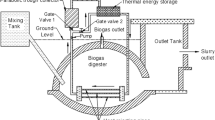Abstract
An experimental investigation conducted to determine optimum mix design concrete for better strength with least cost for thermal energy storage is presented in this paper. Several concrete mix design such as M20, M25, M30, M35, and M40 were identified for conducting the experimental test. Compressive strength test was performed on each of the concrete mix design. M30 was observed to be optimum mix. Split tensile strength test was also performed on this optimum mix design. The tensile strength of the order of 0.25–0.5 of the compressive strength was noticeable. The minimum uncertainty in the reading of data set was observed for M30 mix design. The results obtained in this study will be useful in design and development of large-scale sensible heat storage unit accompanied with charging and discharging cycle. Such storage units can be incorporated in real-time thermal power plants.
Access this chapter
Tax calculation will be finalised at checkout
Purchases are for personal use only
Similar content being viewed by others
Abbreviations
- M :
-
Mix design
- W/C:
-
Water to cement ratio
- IS:
-
Indian Standard
- kN:
-
Kilo Newton
- x i :
-
Particular value of observations
- \(\mu\) :
-
Arithmetic mean
- \(\sigma\) :
-
Standard deviation
- n :
-
Number of observations
- CV:
-
Coefficient of variation
- \(\sigma^{2}\) :
-
Variance
- F :
-
Applied load
- L :
-
Length of the specimen
- \(\sigma_{x}\) :
-
Split tensile strength
- C:
-
Cement
- FA:
-
Fine aggregate
- CA:
-
Coarse aggregate
- W:
-
Water
- OPC:
-
Ordinary Portland cement
- SHT:
-
Sensible heat thermal
- SHS:
-
Sensible heat storage
- ASTM:
-
American Society for Testing and Material
- UTM:
-
Universal testing machine
- D :
-
Diameter of the cylinder
References
Shrivastava AK, Kumar M (2016) Compatibility issues of cement with water reducing admixture in concrete. Perspect Sci 8:290–292
Shen D, Jiang J, Wang W, Shen J, Jiang G (2019) Tensile creep and cracking resistance of concrete with different water-to cement ratios at early age. Constr Build Mater 146:410–418
Nikbin IM, Beygi MHA, Kazemi MT, Amiri JV, Rabbanifar S, Rahmani E (2014) A comprehensive investigation into the effect of water to cement ratio and powder content on mechanical properties of self-compacting concrete. Constr Build Mater 57:69–80
Bello L, Diaz EG, Rougeau P (2019) An original test method to assess water absorption/desorption of lightweight aggregates in presence of cement paste. Constr Build Mater 154:752–762
Yigiter H, Yazici H, Aydin S (2007) Effects of cement type, water/cement ratio and cement content on sea water resistance of concrete. Build Environ 42:1770–1776
Yasar E, Erdogan Y, Kılıc A (2004) Effect of limestone aggregate type and water–cement ratio on concrete strength. Mater Lett 58:772–777
Shamsai A, Peroti S, Rahmani K, Rahemi L (2012) Effect of water-cement ratio on abrasive strength, porosity and permeability of nano-silica concrete. World Appl Sci J 17(8):929–933
Lim SK, Tan CS, Chen V, Lee ML, Lee WP (2013) Effect of different sand grading on strength properties of cement grout. Constr Build Mater 38:348–355
Alhussainy F, Hasan HA, Rogic S, Sheikh MN, Hadi MNS (2016) Direct tensile testing of self-compacting concrete. Constr Build Mater 112:903–906
Gaedicke C, Torres A, Huynh KCT, Marines A (2016) A method to correlate splitting tensile strength and compressive strength of pervious concrete cylinders and cores. Constr Build Mater 125:271–278
Laing D, Bahl C, Bauer T, Lehmann D, Steinmann WD (2011) Thermal energy storage for direct steam generation. Sol Energy 85:627–633
Bai FW, Xu C (2011) Performance analysis of a two-stage thermal energy storage system using concrete and steam accumulator. Appl Therm Eng 31:2764–2771
Pomianowski M, Heiselberg P, Jensen RL (2012) Dynamic heat storage and cooling capacity of a concrete deck with PCM and thermally activated building system. Energy Build 53:96–107
Prasad L, Muthukumar P (2013) Design and optimization of lab-scale sensible heat storage prototype for solar thermal power plant application. Sol Energy 97:217–229
Rao CRC, Niyas H, Muthukumar P (2018) Performance tests on lab–scale sensible heat storage prototypes. Appl Therm Eng 129:953–967
Yu J, Li G, Leung CKY (2018) Hydration and physical characteristics of ultrahigh-volume fly ash-cement systems with low water/binder ratio. Constr Build Mater 161:509–551
Author information
Authors and Affiliations
Corresponding author
Editor information
Editors and Affiliations
Rights and permissions
Copyright information
© 2023 The Author(s), under exclusive license to Springer Nature Singapore Pte Ltd.
About this paper
Cite this paper
Choure, B.K., Bedi, N. (2023). Optimization of Concrete Mix Design for Thermal Energy Storage. In: Pramod P., B., Desai, U.B., Goel, S. (eds) Advances in Material Science and Metallurgy. Lecture Notes in Mechanical Engineering. Springer, Singapore. https://doi.org/10.1007/978-981-19-4918-0_1
Download citation
DOI: https://doi.org/10.1007/978-981-19-4918-0_1
Published:
Publisher Name: Springer, Singapore
Print ISBN: 978-981-19-4917-3
Online ISBN: 978-981-19-4918-0
eBook Packages: EngineeringEngineering (R0)




